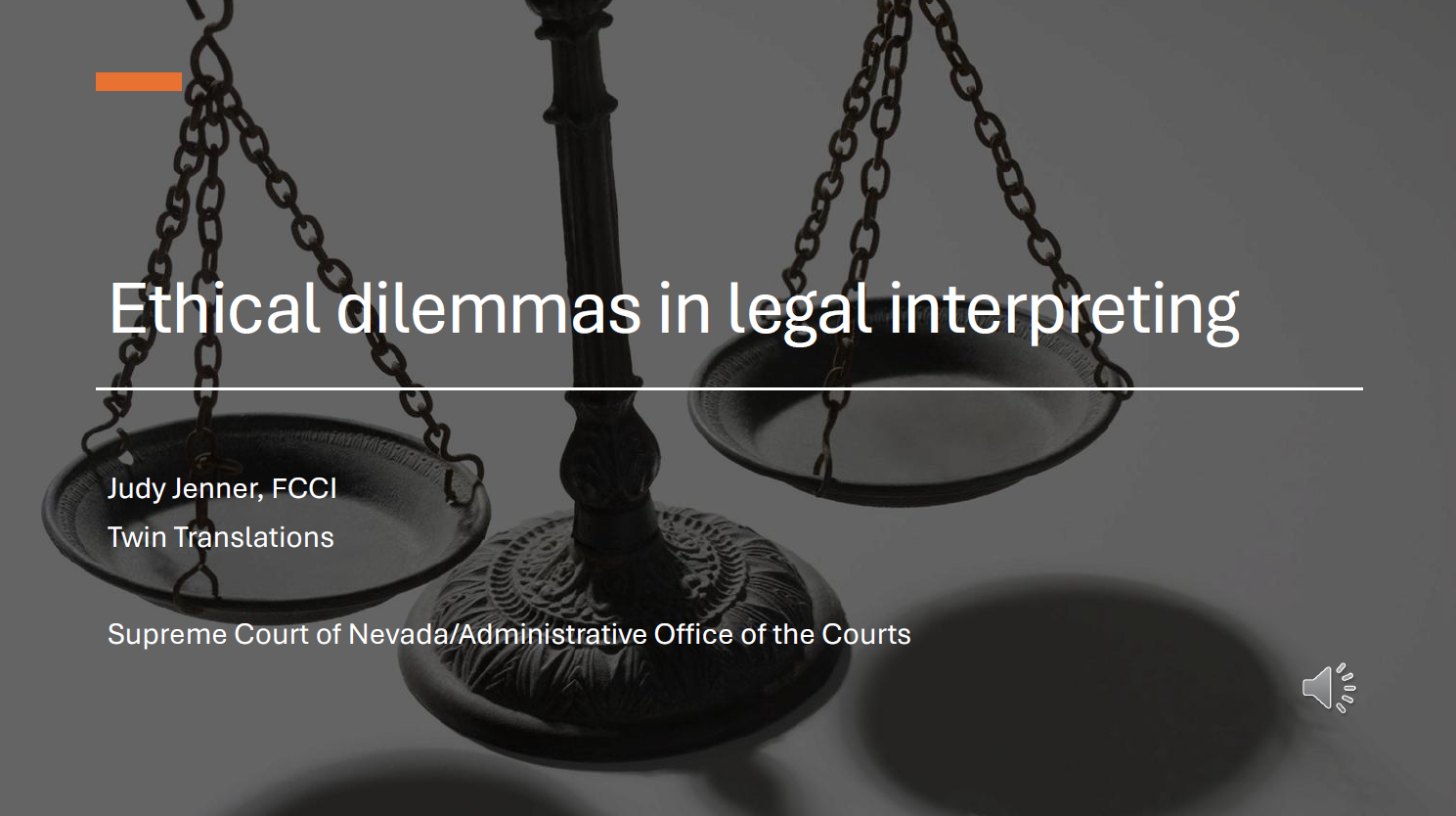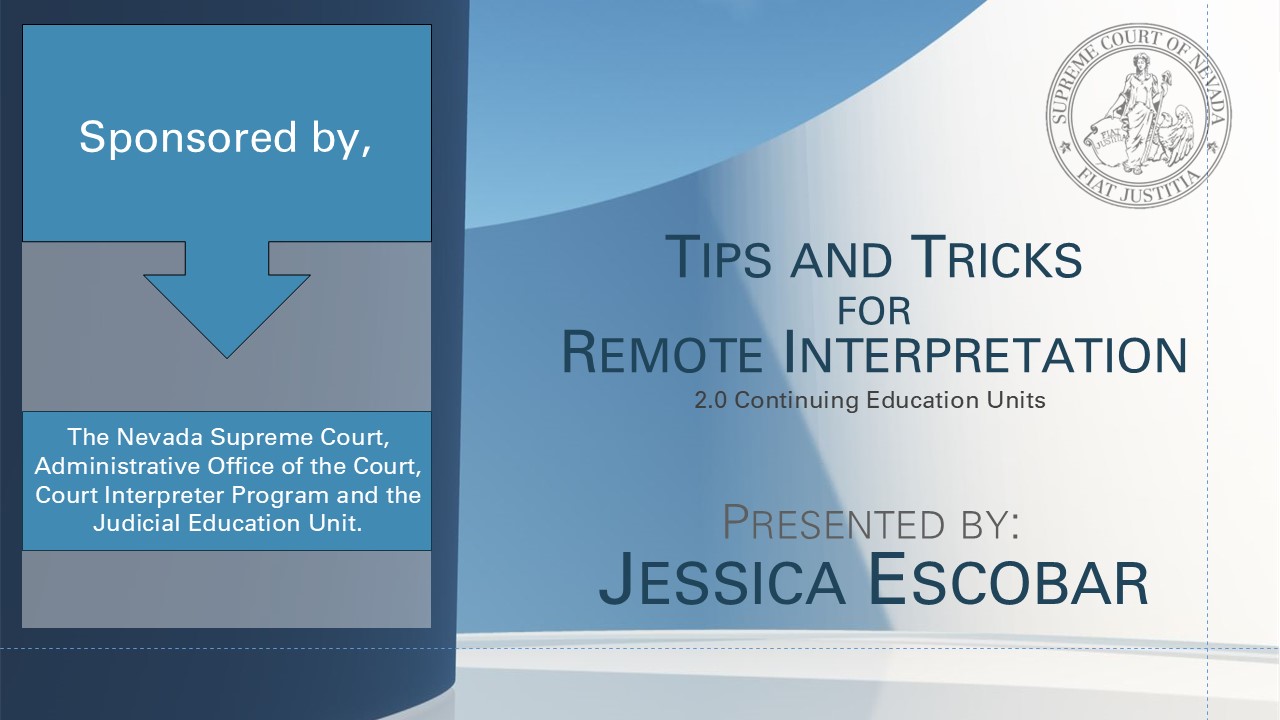Training Description: This course introduces court interpreters to essential medical terminology and concepts commonly encountered in legal proceedings. Participants will learn vocabulary related to injuries, medical evaluations, forensic examinations, mental health conditions, and common clinical procedures referenced in court. Interpreters will build confidence and proficiency in interpreting medical information in courtroom and legal settings.
Faculty: Natalia Cardillo, Federally Certified Court Interpreter
Who Should Attend: Court Interpreters
Continuing Education: This training is approved for 1 General CEC.
Please email your completed Certificate of Attendance (COA) to the Court Interpreter Program (courtinterpreters@nvcourts.nv.gov) upon course completion, required for acknowledgement and proof of attendance. NOTE: CLE credits for this course are not available.
Before You Begin: This course should take approximately 45 minutes to complete. You can complete the course in one session or return to it as often as needed.
The course is organized into three sections:
- Video presentation - 45 minutes in length.
- Course Materials - Presentation outline and/or PowerPoint and additional reference documents; must be read to receive education credit.
- Forms - Certificate of Attendance (COA)-formal acknowledgement of attendance, and Evaluation.
(Recorded October 2025)
(Recorded September, 2025)
Training Description: This training highlights the key habits practiced by successful professional interpreters and is led by Judy Jenner, a federally certified court interpreter. The course focuses on business practices that support credibility and long-term success in the legal field. Participants will learn how to build strong professional relationships and uphold high standards of reliability and professionalism, ensuring they remain trusted, sought-after interpreters within the court system.
Faculty: Judy Jenner, Federally Certified Court Interpreter
Who Should Attend: Court Interpreters
Continuing Education: Please email your completed COA (Certificate of Attendance) to the Court Interpreter Program (courtinterpreters@nvcourts.nv.gov) upon course completion, required for acknowledgement and proof of attendance. NOTE: CLE credits for this course are not available.

(Recorded September, 2025)
Training Description: Court interpreters play a critical role in ensuring justice and due process within the legal system. But what happens when they encounter situations that push the boundaries of ethics, impartiality, or professional conduct? In this webinar, we’ll examine real-world ethical dilemmas court interpreters may face in their day-to-day work. Through practical scenarios, you'll gain deeper insight into how to navigate complex situations while upholding the highest standards of the profession.
Faculty: Judy Jenner, Federally Certified Court Interpreter
Who Should Attend: Court Interpreters
Continuing Education: Please email your completed COA (Certificate of Attendance) to the Court Interpreter Program (courtinterpreters@nvcourts.nv.gov) upon course completion, required for acknowledgement and proof of attendance. NOTE: CLE credits for this course are not available.

(Recorded November, 2024)
Training Description: Consecutive interpreting often *seems* easier than simultaneous, because the interpreter isn't trying to listen and talk at the same time. However, consecutive isn't necessarily easier, and consecutive interpreting in court presents its own set of challenges, particularly when the interpreter's rendition serves as the official record, or when the parties in court grow impatient with the slower pace of consecutive. In this training session, we'll first look at the particular challenges of consecutive interpreting in court, then we'll talk about specific techniques to improve your consecutive interpreting: training yourself in long consecutive interpreting (including long consecutive without notes); improving your use of symbols and abbreviations and improving your ability to retain key pieces of information. We'll also talk about ways to improve your delivery in consecutive interpreting. This workshop will help you gain both skills and confidence; the content is based on the presenter's experience interpreting in court and other settings and completing a Master of Conference Interpreting in a program with a strong emphasis on consecutive.
Faculty: Corinne McKay
Who Should Attend: Court Interpreters
Continuing Education: Please email your completed COA (Certificate of Attendance) to the Court Interpreter Program (courtinterpreters@nvcourts.nv.gov) upon course completion, required for acknowledgement and proof of attendance. NOTE: CLE credits for this course are not available.

(Recorded July, 2024)
Training Description: This training features an in-depth conversation on the code of ethics led by Judy Jenner, a federally certified court interpreter. This course examines how people often use a code of ethics as an excuse to avoid making decisions. This tendency can result in automatic refusals of reasonable requests out of fear of acting unethically. Participants will learn to distinguish between what is genuinely unethical versus what is unprofessional and how this "knee-jerk" reaction can sometimes hinder the advancement of the profession.
Faculty: Judy Jenner, Federally Certified Court Interpreter
Who Should Attend: Court Interpreters
Continuing Education: Please email your completed COA (Certificate of Attendance) to the Court Interpreter Program (courtinterpreters@nvcourts.nv.gov) upon course completion, required for acknowledgement and proof of attendance. NOTE: CLE credits for this course are not available.

(Recorded May, 2024)
Training Description: This training will provide tips and best practices for effective and efficient remote interpretation in courts. Topics covered include equipment, settings, setup, and much more.
Faculty: Jessica Escobar, Certified Court Interpreter, Second Judicial District Court
Who Should Attend: Court Interpreters
Continuing Education: Please email your completed COA (Certificate of Attendance) to the Court Interpreter Program (courtinterpreters@nvcourts.nv.gov) upon course completion, required for acknowledgement and proof of attendance. NOTE: CLE credits for this course are not available.